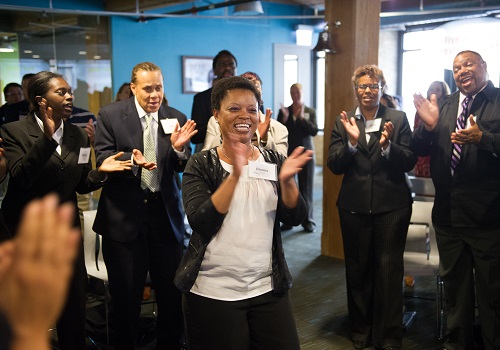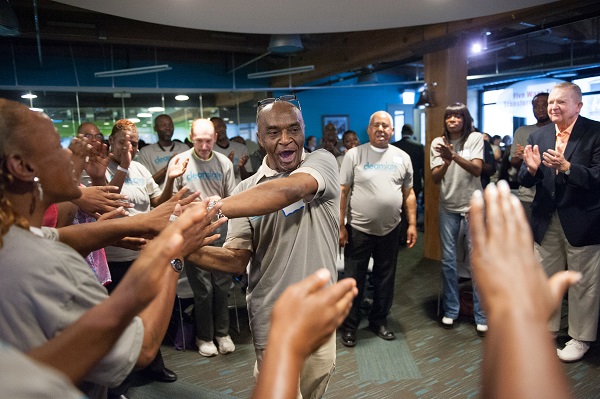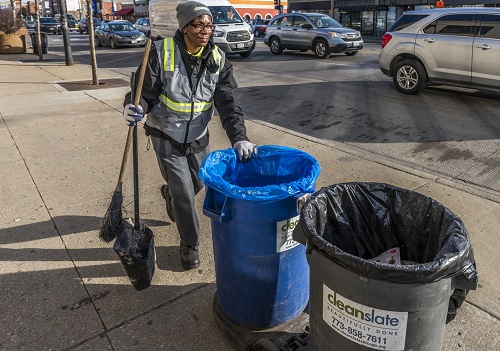It’s 8:25 AM on a Thursday and the daily Morning Motivation is underway. A group of 30 or so have formed a circle and are singing and clapping to popular, upbeat songs that quickly work their magic on this grey and rainy Chicago day. As they break into “Movin On Up”, the nostalgic lyrics evoke new meaning, and we ease our way into the room, its powerful energy our guide.
We’re at Cara, a non-profit Chicago mainstay founded in 1991 with a mission of helping individuals break the cycle of homelessness and poverty, transform their lives, and forge successful paths forward. Their programs include job and life skills training, job placement as well as two social enterprises that help move those needles further along. I’m joined by CEO Maria Kim and Amy Campanelli, Cook County’s Public Defender, who’s here to take a firsthand look at an organization with a shared commitment to helping those who need it most.
The question posed to Cara’s recent cohort at this morning’s Morning Motivation is: who inspired you this week and how? Anyone wanting to proffer a response starts by jogging around the inner circle, slapping hands as they pass, to the encouraging words of their peers. A man I’ll call “John” volunteers with a shout out to a mentor before admitting he’s had a particularly tough week and needs to re-focus. “I will try to…” he starts.
But his choice of words are met with a vocal outcry: “Ain’t nothing to it but to do it…so do it!” they shout in unison. He’s heard the refrain before. So have they all, that much is clear. John smiles, pauses and starts again. His declaration complete, everyone rises again to their feet, cheering him on and following his lead as he belts out a song that sums up his commitment to his future and to Cara.
Motivation, indeed. It’s central to Cara’s vision – and it’s not hard to see why.
According to the latest stats, over 600,000 Chicagoans live in poverty and, on any given day, 6500 people are street homeless. Some neighborhoods face unemployment rates north of 30 or 40%. Though the country’s overall recovery is on the upswing after its last economic downturn, Chicago is still suffering unemployment at markedly higher rates. Meanwhile, the city’s crime rate, according to Chicago Police Department’s Bureau of Records, is significantly higher than the US average. And approximately 40,000 post-incarcerated individuals return each year to Illinois, with 20,000 or so converging upon Chicago, all in search of work.
Those realities necessitate a holistic approach at Cara. “What we have come to understand over two decades or so is that it’s not just about the job, it’s actually first and foremost about the person,” says Kim. Before they can focus on teaching new skills and how to find and keep jobs in the long-term, Cara has other work to do.
“Oftentimes people in this situation have been beaten up literally and figuratively, so we have to unpack what happened up to this point and try to restore a bit of their esteem and confidence in themselves first.”
To help meet their mission, Cara runs two social enterprises: Cleanslate – which provides paid transitional jobs in neighborhood beautification projects (more on that below) – and Cara Connects, a contract staffing firm with a revenue of $1 million. The initiatives have been instrumental in helping the organization achieve its current revenue of $8 million – and its goal of helping people rise above and toward more sustainable paths.
Kim points to a board on their wall showcasing the jobs students have found over the past few years and highlighting retention rates. Last year those rates reached 78% and hover around 70% most years, well above the average retention rate of similar industries across the country of 49%. Cara makes it a point to stay in contact with students well past the year to ensure they’re on track. “We have a stick-and-stay rate that’s pretty impressive,” affirms Kim proudly. “We don’t want it to end after the permanent job.”
Of course, there have been many lessons learned along the way, including the need to temper expectations of others, such as investors and philanthropists. “We need to measure ourselves against the reality,” Kim says. That reality prompted two of their other social enterprises to close their doors but Kim remains proud of the organization’s track record, especially in light of the fact that one in five small businesses fail. With two initiatives still standing, making money and, most importantly, representing 450 new jobs a year, Cara is meeting their mission head-on. That’s the definition of success.
Cleanslate started 11 years ago in the aftermath of the war on drugs that saw an abundance of people coming out of the prison system with no viable employment opportunities.
Sure, these former incarcerated served their time and were rehabilitated but employers are seldom forgiving of conviction histories. “We realized if we want to serve folks in need of employment, we needed to create our own jobs,” says Kim, adding their social enterprise was modeled after a similar initiative by the Doe Fund in New York.
Cleanslate interns – whose average age is 40 and share common post-incarceration challenges – perform a range of exterior maintenance work, from sidewalk sweeping to snow removal, landscaping, garbage cleanup and graffiti removal – for which they’re paid minimum wage.
One of Cleanslate’s main clients are 20 of the city’s Special Service Areas (SSAs) whose mission is to keep their communities clean. They and other customers have enabled Cleanslate to earn roughly $3.5 million a year. It’s no cash cow but it is self-sustaining, says Kim. “We don’t have to drive private philanthropy to create jobs; we’re earning income from our clients and using that money to pay individuals we’re employing through the business.” To be sure, the social enterprise employs about half of the students at Cara, with the ultimate hope of fattening up their resumes toward long-term careers.
I join operations manager, Ron Holakovsky, for a drive through the neighborhoods where Cleanslate is active. Holakovsky came here from the for-profit sector, following his wife who did the same when they moved back to Chicago a few years ago. He was looking for more meaning and balance in his life; he seems to have found it.
One of Cleanslate’s challenges, Holakovsky shares, is the need to charge a higher rate than some of their competitors to cover their costs (minimum wage is currently $10.50/hour and will be rising to $11.00 in July, benefits and other expenses) while still bringing in a profit to make themselves sustainable. It’s a challenge that comes up in conversation when we make a quick pit stop at the Wicker Park SSA office to take the temperature on the ground.
“Cleanslate is not the cheapest but we’ve stayed with them because they’re a great partner for the past 10 years and we’re proud to support their mission,” affirms managing director, Jessica Wobbekind. She adds that many Cleanslate interns live in the neighborhood so the partnership is also a valuable community reinvestment opportunity.
The balance between profit and mission is never an easy one, Kim tells me later, explaining that if Cleanslate focused on securing more property management clients, they would make an even greater profit. But SSAs represent a greater quantity of work opportunities, which most directly feeds their mission. The mission always wins; it just has to. That they share such a strong, welcoming and well-aligned partnership makes the decision an even easier one.
Holakovsky and I then circle the neighborhood of Wicker Park looking for the 10-person crew working on the community’s SSA and find them on break at a Wendy’s parking lot. “Ron” shares his particular challenge that morning: chasing runaway Styrofoam cups while on garbage cleanup duty. Just another day at Cleanslate, he adds, laughing. Each worker has a unique personal story but all seem eager to make their internship work – with their sights set clearly on the future. “It’s all about getting into a career path,” says “Lisa”, and the group nods in agreement. The most energetic of the bunch, “Debbie”, is feeling particularly positive that morning. “I’m getting to clean up the world and get paid for it; I can’t complain.”




